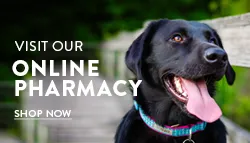Approximately 60% of all pets in the United States are overweight. Here are a few misconceptions and tips about diet that may help you to improve your pet’s body condition.
1. “My cat just grazes on dry food - she’s not overeating.”
One of the biggest problems that we see with cats is that they are eating too much dry food throughout the day. Whether it is because they are bored or just really like the taste of the kibble, cats will often eat too much when it is provided in unlimited amounts. Cats are carnivores, and since dry food tends to have more carbohydrates than wet foods, this habit lends itself to obesity. When cats become obese, they are at high risk for diabetes. Meal-feeding with measured amounts of food and/or switching to wet food may help to curb obesity in cats.
2.“My pet can’t be overweight - I only feed him once a day!”
We often hear pet parents express surprise that their pet is overweight because they are only giving a meal once daily. Feeding our pets less often doesn’t help them to lose weight. They may actually lose weight faster if they are eating smaller, more frequent meals.
3. “If my dog is overweight, it’s only because I don’t walk him as much as I used to”
Exercise is definitely an important part of a healthy lifestyle. Among many other benefits, it helps develop muscle strength which can support arthritic joints, and is good for our pets’ emotional well-being. It also helps them to burn more calories, but reducing calorie intake often has a bigger impact on weight. Both giving less food and more exercise is ideal!
4. “But I only give him one scoop!”
What is a “scoop”? One of the biggest mistakes we make in feeding our pets is not knowing exactly how much we are giving them. One “scoop” is often bigger than we think it is. Figuring out the volume of food that you are giving to your pet in measuring cups can help your veterinarian to advise you on adjustments that may help your pet to lose weight. By the way, don’t just rely on the amount of food recommended on the bag - it’s often too much!
5. “Those treats are so small!” or “She only gets a tiny amount of table food.”
One thing we need to keep in mind is that our pets are often a lot smaller than we are. To a small dog, 1 small bite of meat is equivalent to eating a whole hamburger! A few extra treats or bites of table food throughout the day can add a lot of extra calories.
Dr. Tinanoff


